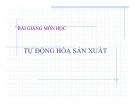
http://www.iaeme.com/IJMET/index.asp 434 editor@iaeme.com
International Journal of Mechanical Engineering and Technology (IJMET)
Volume 10, Issue 03, March 2019, pp. 434–440, Article ID: IJMET_10_03_044
Available online at http://www.iaeme.com/ijmet/issues.asp?JType=IJMET&VType=10&IType=3
ISSN Print: 0976-6340 and ISSN Online: 0976-6359
© IAEME Publication Scopus Indexed
EVALUATION OF TRAINING PROGRAM FOR
WAREHOUSE MANAGER CANDIDATES
WITHIN THE WAREHOUSE RECEIPT SYSTEM
SCHEME AT COMMODITY FUTURE TRADING
REGULATORY AGENCY (COFTRA)
INDONESIA
Tris Sudarto
Doctoral Program of Human Resource Management,
Jakarta State University, Jakarta, Indonesia
Moch. Asmawi
Jakarta State University, Jakarta, Indonesia
Mahmuddin Yasin
Jakarta State University and Krisnadwipayana University,
Jakarta, Indonesia
Adji Suratman
STIE YAI, Jakarta, Indonesia
ABSTRACT
This study aims to evaluate the implementation of training program for warehouse
manager candidates within the warehouse receipt system scheme conducted by the
Commodity Futures Trading Regulatory Agency (Coftra) in Indonesia. This research
is an evaluative research using the CIPP model of Stuffle Beam (Context, Input,
Process, Product), supported by questionnaires (closed and open statements /
questions), observation, and interviews. Evaluation on context, input, and process, the
results show that the program is in a good category for these three componets, with
some elements needing improvement. While for product evaluation the results for this
component are in a very good category, so it needs to be maintained. In terms of
outcomes which are part of the product component, the results of the training provide
a good impact of implementing warehouse management system, with warehouse
operational license..
Key words: training, warehouse receipt system, CIPP model.

Tris Sudarto, Moch. Asmawi, Mahmuddin Yasin, Adji Suratman
http://www.iaeme.com/IJMET/index.asp 435 editor@iaeme.com
Cite this Article: Tris Sudarto, Moch. Asmawi, Mahmuddin Yasin, Adji Suratman,
Evaluation of Training Program for Warehouse Manager Candidates within the
Warehouse Receipt System Scheme at Commodity Future Trading Regulatory Agency
(COFTRA), Indonesia, International Journal of Mechanical Engineering and
Technology 10(3), 2019, pp. 434–440.
http://www.iaeme.com/IJMET/issues.asp?JType=IJMET&VType=10&IType=3
1. INTRODUCTION
Indonesian population[1] in the next two decades is estimated to reach around 1.1% per year,
as many as 255.5 million people in 2015, and increase in 2035 to 305.7 million people. This
will increase food consumption needs of the population, whose main staple is rice. The
fulfillment of rice consumption is prioritized by producing it domestically, so that food
security and food sovereignty are maintained. Food needs [2] can be fulfilled independently
by empowering human capital, social and economic capital owned by Indonesian farmers,
which in turn must have an impact on improving the welfare of farmers and the community.
One of the crucial agricultural sector problems is commodity prices factor, where during
the harvest season, commodity supply increases, commodity prices decline drastically,
creating a very low bargaining position of farmers. This condition continues to occur from
time to time and can reduce the interest of farming communities, which in turn can threaten
national food security.
For this reason, the government issued Law Number 9 of 2011 concerning the Warehouse
Receipt System (WRS)[3], which among other things to encourage the smooth production of
agriculture in efforts to promote equitable public welfare through the warehouse receipt
system as one of the financing instruments. With the instrument mechanism of the warehouse
receipt system, farmers can delay selling if commodity prices are low, and sell them later
when prices increase according to expectations. During the postponed selling period, farmers
can obtain loan funds by collating their commodity warehouse receipts, thereby increasing the
bargaining position of farmers. This needs a paradigm shift of farmers from "workers" to be
"entrepreneurs".
In the past eight years (2010 to 2017) the value of warehouse receipts issued (grain / rice
commodity), amounting to Rp533 billion, with a financing value of Rp309 billion. This
means that the value of the issuance of warehouse receipts of Rp523 billion is only 0.16 per
cent of the national commodity potential values of rice. However, there are still many other
types of commodities that have not been converted to warehouse receipts scheme. While the
number of warehouses that have been certified in the WRS until the end of 2017 is 88
warehouses of which the government has built as many as 121 warehouses[4].
To accelerate the implementation of the WRS through the Commodity Futures Trading
Regulatory Agency - Ministry of Trade, the government conducts a continuous training
program of the warehouse receipt system. This is important to increase the understanding of
the warehouse receipt system among stakeholders (the state civil apparatus, business people,
and the community).
The WRS training program carried out by Coftra is attended by participants from various
stakeholders, including: agricultural extension officers, related service officials at the
provincial / district government, warehouse manager candidates within the WRS scheme, and
farmers who join farmers' groups. Program evaluation conducted in this research is related to
training programs for warehouse manager candidates within the WRS scheme.

Evaluation of Training Program for Warehouse Manager Candidates within the Warehouse Receipt System
Scheme at Commodity Future Trading Regulatory Agency (COFTRA), Indonesia
http://www.iaeme.com/IJMET/index.asp 436 editor@iaeme.com
2. LITERATURE REVIEW
Training [5] “means giving new or current employees the skills that they need to perform their
jobs ". Swanson [6] state that “training and development constitutes the largest realm of HRD
activity. Training and development is defined as a process of systematically developing work-
related knowledge and expertise for the purpose of improving performance." Training and
development programs aim to maintain or improve individual performance and organizational
performance. Training is also beneficial for the organization if it is linked to organizational
needs and if training can motivate employees. Greenberg and Baron's [7]said that training is a
process of teaching workers systematically to get and improve work-related skills and
knowledge. So, training is the process of a person getting knowledge and skills to be able to
improve individual capabilities and performance so that they can contribute to improving
organizational performance and achieving organizational goals.
Kirkpatrick and Kirkpatrick[8] state that planning and implementing effective training
programs must consider the following: (1) Determining needs; (2) Setting objectives; (3)
Determining subject content; (4) Selecting participants; (5) Determining the best schedule; (6)
Selecting appropriate facilities; (7) Selecting appropriate instructors; (8) Selecting and
preparing audiovisual aids; (9) Coordinating the program; (10) Evaluating the program. Based
on Noe et al. (2011) designing training begins with the steps to conduct training needs
assessments; then ensure that employees are ready to take part in training related to attitudes,
motivation, basic skills, and work environment. The next step, planning a training program,
including: the program objectives, instructors, and methods; then implementing the training
program. Finally, evaluating the results of the training and provide feedback for planning
future training program. Training programs can be prepared by themselves or hold training
using vendor assistance. Training contents need to be verified that are directly related to the
training objectives. Training content must be able to improve learning and benefit
participants. Training must be relevant to the needs and objectives of the organization to
ensure that training budget funds do not become useless.
The training process[9] mainly involves instructors and trainees, which will result in
changes in the trainees, usually non-physical, namely: changes in attitudes, knowledge, and
skills. The results of the training are outputs and outcomes. Output is measured by increasing
expertise, while outcomes are measured by social achievement. Measuring the output of
training results can be done more easily through tests and questionnaires, which can be
measured immediately. While measuring outcomes is more difficult to do, because it is
related to social achievement in the community, and is long-term.
Warehouse Receipt [3] is a document proof of ownership of goods stored in a warehouse
issued by the warehouse manager. The Warehouse Receipt System is an activity related to
the issuance, transfer, guarantee, and settlement of warehouse receipt transactions. Warehouse
Receipts are treated as securities, so they can be transferred or traded on organized markets
(exchanges) or over the counter. This can encourage the creation of a more efficient
commodity trade by eliminating the cost of moving commodities. The Warehouse Receipt
System is one solution to the problems in the agricultural sector as during the abundant
harvest commodity the prices are decreasing. For this reason, farmers need to delay selling,
waiting for an increase in the expected price level. Financing requirements due to delayed
sales can be met by obtaining financing with warehouse receipt collateral through a
warehouse receipt system scheme.
The development of warehouse receipts as stated by UNCTAD and Giovannucci et al.
[10]have been implemented successfully in the United States, Latin America, and Asia. In the
United States[11], since the 19th century, people with personal initiatives have run a

Tris Sudarto, Moch. Asmawi, Mahmuddin Yasin, Adji Suratman
http://www.iaeme.com/IJMET/index.asp 437 editor@iaeme.com
warehouse receipt system that can be traded (transferable), and then with the US Warehouse
Act published in 1916, warehouse receipts are growing. However, the implementation of the
warehouse receipt system faces a number of problems in the Sub-Saharan African countries,
[12]whose barriers have been documented by Onumah[13] and Nordier[14] in Malawi, and by
Salami et al. [15] in the countries of Tanzania, Kenya and Ethiopia.
The warehouse receipt system in Indonesia is regulated by Law Number 9 of 2011 as an
amendment to Law Number 9 of 2006, not yet widely known by farmers, business people,
and other stakeholders. For this reason it is necessary to conduct training, socialization and
education continuously and sustainable. The use of warehouse receipt instruments can
encourage the formation of more reasonable agricultural commodity prices. The benefits of
warehouse receipts include: helping farmers overcome the problem of post-harvest financial
difficulties due to delayed selling waiting for an increase in commodity prices; freeing
farmers from the debt bondage, middlemen, and moneylenders; increase farmers' income by
selling crops when commodity prices are high; can maintain the stability of agricultural
commodity prices; encouraging farmers to improve the quality of yields to match the
standards set, and can be used as collateral for loans without other additional collateral.
3. METHOD
This research is an evaluative research, aiming at analyzing and assessing the training
program of warehouse manager candidates within the WRS scheme conducted by the
Commodity Futures Trading Regulatory Agency, Ministry of Trade. Field research is
conducted from May to December 2017. Evaluative research aims at gathering information
about the actual conditions of implementation of the program. Evaluation can use mixed
research methods namely quantitative method and qualitative method simultaneously.
Characteristics of mixed research methods include using two types of data, namely
quantitative data and qualitative data. Quantitative data is in the form of numerical numbers,
while qualitative data is in the form of descriptions of words, photos, videos, audio
recordings, or images. Other characteristics of this method are interpretative and statistical
analysis. Interpretative analysis method is done by interpreting the data found. While the
statistical analysis method is done by tabulating and analyzing the data obtained using
statistical formulas. Both of these characteristics are in accordance with research on the
evaluation of training programs for warehouse manager candidates within the WRS scheme.
3. RESULT AND DISCUSSION
Context evaluation for training programs for warehouse manager candidates within the WRS
scheme shows that there is a correspondence with government policies on training and the
purpose of training programs. Context evaluation results show an average score of 73,3%,
meaning in good category.
However, there are several components of the context evaluation stage that need to be
improved, among others: basic technical training policies, more intensive socialization of
Coftra's vision and mission, and the need for a comprehensive evaluation of previous WRS
training.
Input evaluation for training programs for warehouse manager candidates within the WRS
scheme is measured by planning quality indicators and quality of input resources consisting
of: readiness of trainees, training instructor readiness, training implementers' readiness,
training curriculum, and training infrastructure. The results of the input evaluation show an
average score of 79,5%, meaning in the good category
However, there are several components of the input evaluation stage that need to be
improved, among others: first, the planning aspect of the training program that needs to be

Evaluation of Training Program for Warehouse Manager Candidates within the Warehouse Receipt System
Scheme at Commodity Future Trading Regulatory Agency (COFTRA), Indonesia
http://www.iaeme.com/IJMET/index.asp 438 editor@iaeme.com
improved so that the expected goals can be optimized; second, increasing the readiness of
training participants by requiring minimal education levels; third, to improve the quality of
the training instructor's readiness, it can be required to have a certain certificate of expertise
and prioritize among practitioners; fourth, to improve the quality of the training curriculum, it
is necessary to regulate with more technical regulations by increasing the proportion of
training time for practices, and fifth, the training infrastructure requires additional equipment
for practice, and the completeness of the WRS reference book in the library.
Process evaluation for training programs for warehouse manager candidates within the
WRS scheme measured by indicators: activity of training participants, interaction of training
learning, training instructor performance, training organizing services, and utilization of
training facilities and infrastructure. The results of the process evaluation showed an average
score of 75,6%.
However, there are several components of the evaluation process that need to be
improved, among others: first, the activities of the trainees, the need to increase training
participants' discipline; second, learning interactions need to be refined during practical
training in the WRS warehouse; third, instructor performance needs to be optimized where the
discussion of training material is relatively the same between one instructor and another
instructor in order to avoid training time; fourth, the training organizing service is optimized
by avoiding several activities that overlap and run job descriptions consistently; fifth, the
addition of instructors resource persons from other stakeholders, and the addition of several
topics related to the warehouse receipt system; and sixth, the use of information technology
infrastructure needs to be optimized by increasing internet connection capacity.
Product evaluation for training programs for warehouse manager candidates within the WRS
scheme measured by indicators: assessment of training participants' results, assessment of the
implementation of training programs, results of training programs, benefits of training
programs, and impact on WRS development. The results of product evaluation showed an
average score of 86,7%.
However, the assessment of the results of the trainees needs to be refined by measuring
the increase in knowledge of each trainee. Assessments made on the results of the training
participants, measured from the realization of the target, obtained a business license as the
WRS warehouse manager, which in this case means an assessment of results related to the
outcome, means measuring the impact of a program. All participants (13 groups of warehouse
manager candidates in the WRS), have submitted a business plan until the end of 2017, and
Coftra is informed that the warehouse manager will obtain a business license as WRS
warehouse manager in 2018.
The cost-benefit measurement shows that the realization of the expenses for the training
program of warehouse manager candidates in the WRS scheme, for 2017 was amounted to
Rp1,6 billion. Meanwhile to measure the benefits of the program is carried out by linking the
objectives of the training with the implemention of the WRS warehouse management of the
government-owned warehouses which have been built but without any WRS warehouse
operational license yet. The value of the WRS warehouse construction in the 13 districts is
around Rp39 billion. So that the cost-benefit comparison between training costs and WRS
warehouse construction costs is 4,1%, a ratio that can encourage the effectiveness of
implementing government-owned WRS warehouses. However, for the improvement of
outcomes on the benefits of further training programs, it is necessary to synergize government
officials at the central and regional levels, and to encourage empowerment and involvement
of the community and stakeholders.
The results of the study showed that the training of warehouse manager candidates within
the WRS scheme had a significant role in improving the ability to manage the WRS

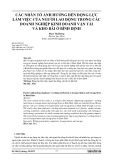
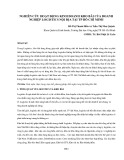
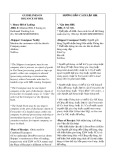
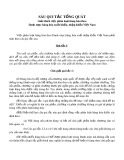
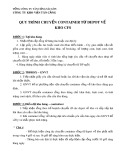
![Quy trình nhập xuất hàng hóa cửa hàng [chi tiết]](https://cdn.tailieu.vn/images/document/thumbnail/2019/20190827/xylitolcool/135x160/581566889737.jpg)

![Quyết định xếp hàng vào kho [Chuẩn SEO]](https://cdn.tailieu.vn/images/document/thumbnail/2013/20131219/doremon_12/135x160/5311387426255.jpg)
